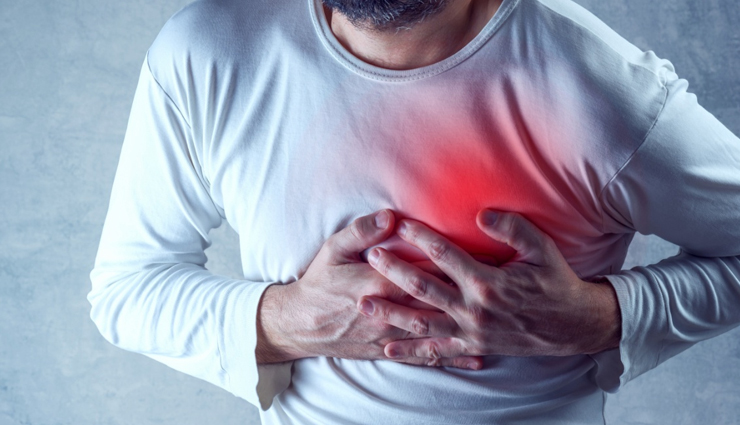- Home›
- Healthy Living›
- Everthing You Need To Know About Angina Pectoris
Everthing You Need To Know About Angina Pectoris
By: Kratika Wed, 04 Aug 2021 5:32:42

Angina is transitory agony or uneasiness in the chest that happens when insufficient oxygen-conveying blood arrives at your heart muscle. The expression "angina" signifies torment, while "pectoris" alludes to the chest.
Angina side effects change. Some of the time it seems like indigestion, like what you might feel in the wake of eating a substantial feast. On the off chance that you feel this aggravation routinely, it could be an indication of coronary illness.

What causes angina?
Angina is regularly a sign that you have coronary illness, explicitly a blockage of at least one of the fundamental veins providing the heart muscle, known as the coronary courses. Ladies might have blockages in the tiny supply routes that branch out from the coronary courses.
Angina is the most commonplace manifestation of coronary illness. In the United States, around 10 million individuals experience the ill effects of angina. An angina assault happens when the impeded vessel forestalls satisfactory blood stream, or when there is a fit of the vessel prompting diminished blood stream to the heart muscle. Fit regularly happens very still and ordinarily occurs without any forethought.
Does angina cause or deteriorate a heart condition?
Normally, angina doesn't cause any heart harm. Angina is more similar to a notice sign, and it can mean you're at more serious danger of having a coronary failure. Regardless of whether you're climbing uphill, having a warmed contention with your accomplice, or processing a five-course connoisseur dinner, angina is your heart's method of disclosing to you that you're making it buckle down and that it isn't getting sufficient blood and oxygen.

What are the side effects of angina?
Despite the fact that they differ from one individual to another, these are the common side effects:
*A sharp or dull torment, snugness, pressing factor, crushing or consuming sensation in the chest
*Pain in your arms, neck, jaw, shoulder or back, going with chest distress (these indications regularly happen during actual effort, passionate pressure or eating)
*Tingling, throbbing or deadness in the elbows, arms or wrists (particularly your left arm)
*Shortness of breath
*Perspiration
*Nausea
*Fatigue
*Anxiety

*Dizziness
Angina indications in ladies can incorporate inclination exhausted, sickness, regurgitating, stomach torment or wounding chest torment.
How is angina analyzed?
Your medical services supplier (HCP) can decide whether you have angina by taking a gander at your manifestations and having you play out a pressure test, which generally implies strolling on a treadmill.
You'll be snared to an electrocardiogram (EKG), which estimates the electrical movement of the heart previously, during and after the pressure test. Your circulatory strain will likewise be observed all through. Trademark changes happen on the EKG if coronary illness is available.
But since a pressure test is intended for screening, you might require different tests, like an atomic output or an angiogram. In an angiogram, a color is infused into your blood and a X-beam is taken of the heart and its veins.

How is angina treated?
The typical prescription for an assault of angina is dynamite put under the tongue. It expands veins so more blood can arrive at the heart. Dynamite is likewise accessible in pill or fix structure to forestall indications. To note: Anyone taking dynamite ought to try not to utilize Viagra (sildenafil), in light of the fact that a genuine drop in circulatory strain could result.
After you've gone through a full assessment, your doctor might recommend different drugs, for example, beta blockers and calcium channel blockers, which can assist with forestalling angina too. Your primary care physician may likewise need you to take headache medicine consistently, which lessens the capacity of blood to clump. This permits blood to stream all the more effectively through limited corridors.
You may likewise profit with learning pressure decrease strategies, for example, contemplation or unwinding works out. Check your nearby public venue for classes or studio postings or investigate online alternatives.
How would it be advisable for me to respond in case I'm having an angina assault?
A great many people who have been determined to have angina are endorsed dynamite tablets. You ought to consistently have them with you or close by. Keep them in a few places at home and work.

Plunk down and rest, in case you're not previously sitting, and put one tablet under your tongue to break up. Dynamite can cause unsteadiness, so bring it plunking down and to get up leisurely once you feel much improved.
The American Heart Association suggests taking one dynamite tablet. On the off chance that the torment has not improved or has deteriorated following five minutes, call 911 quickly for a rescue vehicle in the event that you are having a coronary failure. When you are in touch with crisis administrations, you might be told to rehash the portion of dynamite up to two additional occasions in five-minute stretches.
How would I realize whether I'm encountering angina or a respiratory failure?
It's not difficult to confuse an angina assault with a coronary failure. The two of them will in general beginning with chest torment. Both can be set apart by torment, deadness or shivering in the neck, shoulders, arms and jaw. The thing that matters is that with the most widely recognized type of angina, rest and prescription alleviate the side effects in a few minutes.
In case you are having a coronary episode, the aggravation won't disappear and it might turn out to be more serious. In spite of the fact that angina can cause chest torment and inconvenience, respiratory failure torment is by and large more serious.
Ladies regularly experience cardiovascular failures uniquely in contrast
to men and may have side effects inconsequential to chest agony like
windedness, queasiness, perspiring, unsteadiness or uncommon exhaustion.
On the off chance that you at any point feel these side effects for
sure could be portrayed as "an elephant sitting on your chest," call
911—they are indications of a cardiovascular failure.
Does prescription consistently assist with facilitating an angina assault?
Drug
helps in the event that you have stable angina, the most well-known
sort. Yet, in case you've been determined to have shaky angina,
indications are not quite the same as your typical example of angina and
might flag a coronary episode. Prescription regularly doesn't assist
with settling unsound angina.
Unsound angina for the most part
keeps going longer than a couple of moments and regularly happens when
you're not striving. In the event that you have shaky angina, you need
to talk about with your primary care physician how to screen your
condition and when you ought to look at indications as a crisis.
Knowing
the example of your angina assaults should assist you with recognizing a
genuine crisis, particularly in case there are changes in length, cause
or force.
On the off chance that I have angina, what do I need to never really mind of myself?
Your
primary care physician will prompt you on the amount you can do
dependent on the consequences of your tests. A directed exercise program
for heart patients can be incredibly useful, however you might have to
adjust your exercises so you don't strain yourself.
On the off
chance that a major, rich supper sets off an angina assault, attempt
more modest segments. On the off chance that strolling rapidly causes
manifestations, moderate your speed. In freezing or breezy climate,
you'll likely need to wrap up and cover your head and face. Your primary
care physician might even advise you to put a dynamite tablet under
your tongue prior to venturing outside. What's more, on the off chance
that you've had a cardiovascular failure as of now, your primary care
physician might endorse a low portion of ibuprofen consistently to
forestall another.
On the off chance that you experience heart difficulty, you'll be better if follow these rules:
*Control hypertension, diabetes and elevated cholesterol levels.
*Maintain a low-fat, low-sodium diet.
*If you smoke, quit.
*Reduce or stop your liquor utilization.
*If you're overweight, attempt to drop a couple of pounds.
*Exercise for 30 minutes something like 5 days seven days, except if your PCP precludes it.
Coronary
illness is for the most part treated with medicine. Now and again, be
that as it may, individuals have effectively turned around coronary
illness by working out, following a severe, plant-based low-fat eating
regimen suggested by their primary care physicians and making other way
of life changes.





